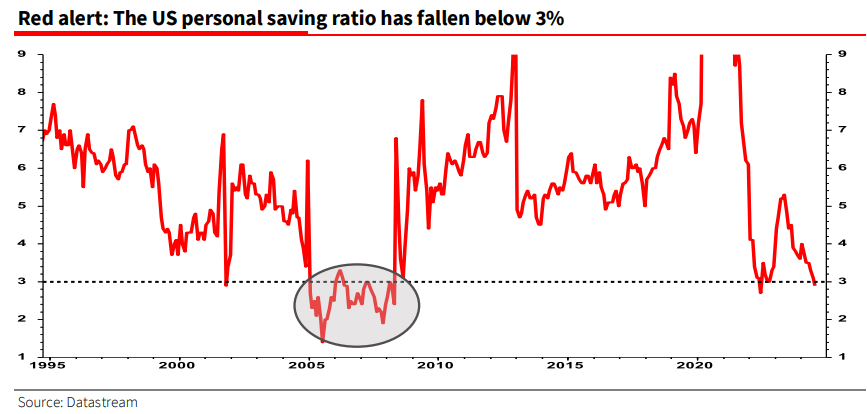Albert Edwards on the US economy.
I must apologise for falling asleep on the job. I hadn’t spotted that the US personal saving ratio (SR) had slid all the way back to what I would describe as crisis levels. July’s decline below 3% should be sounding a very loud warning claxon in the ears of investors to not forget what happened in 2007 when the SR fell this low.
It would be a fair to say that the US consumer has surprised on the upside this year growing by a heady 2.7% yoy in July. But where has this strength come from at a time when real incomes have been growing by a paltry 1% yoy?
This year has seen something highly unusual drive consumer spending – namely an unusually deep decline in the personal sector SR below 3%, something only previously seen on a sustained basis in the giddy days of misguided euphoria in 2005-07 prior to the 2008 GFC.
To be sure, the US household sector balance sheet is nowhere near as overextended as it was back in 2007. Nevertheless, any rise in the SR will slow GDP growth sharply.
Now the SR is one of the few things I confidently claim to know something about, having started my career 40 years ago by working on the personal sector at the Bank of England. If boring people about the intricacies of the SR were an Olympic event, I would have been on that podium winning a gold medal for Team GB. Forty years on, I might still win a bronze.
The US personal sector SR is released as part of the BEA monthly Personal Income and Outlays report – link. In the last few years, that release has attracted close market scrutiny because it contains the Personal Consumption Expenditure (PCE) deflator measure of inflation – especially as the core PCE deflator is the Fed’s official inflation target, not core CPI.
But attention may be about to switch from core PCE as the most important part of this data release, to the SR. For history suggests when the SR sinks this low, it usually proves unsustainable with a subsequent rise triggering a recession.
The slide in the SR from 4% at the start of this year was not due to households dipping into to their pandemic-era excess savings, which have been long since spent. But it seems that households have become used to running down their savings and can’t break the habit.
A rising SR slows consumer spending growth below income growth (and vice versa) so it’s a likely recessionary event when real personal incomes are currently only growing by a miserly 1%. The August data is due out this Friday 27 Oct. Keep an eye on developments


